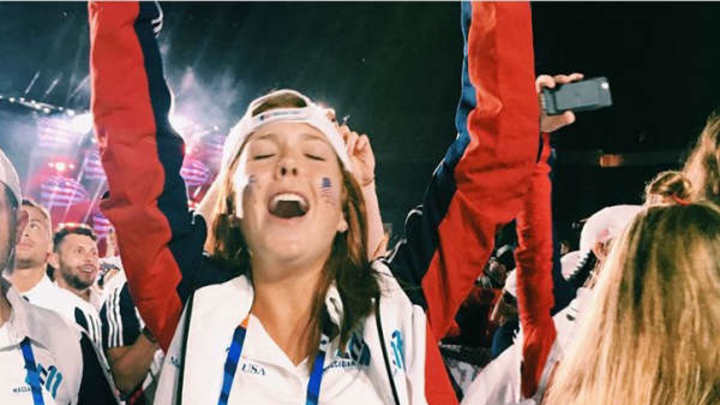Maccabiah Games go beyond thrill of victory

Last summer, when LPGA pro Laetitia Beck represented Israel in golf's return to the Olympics, she could've said, "Why all the fuss?"
After all, as far as Beck was concerned, golf already was an Olympic sport, and she was a two-time gold medalist (2009 and 2013).
Corey Pavin won gold in 1981. So did Bruce Fleisher, back in 1969. And golfers from more than 50 countries are shooting for gold this month at the 20th Maccabiah Games in Israel, which span two weeks and conclude July 18.

Golfer Hannah Berman, 19, of Ponte Vedra Beach, Fla., celebrates in Jerusalem during the opening ceremonies for the Maccabiah Games.
Just like the Olympics, the Maccabiah Games are held every four years, but limited to athletes of the Jewish faith. Started in 1932 with a handful of countries representing the Jewish diaspora on the athletic field, The Mac Games, as they are known, now host more than 12,000 athletes from 80 countries participating in 50 sports. It is the third-largest international athletic competition in the world, behind only the Olympics and FIFA World Cup in size.
Among the 30 American golfers participating is Alexa Popowitz, 20, of Boca Raton, Fla., a junior at Georgetown University, where she was named Big East Conference Golfer of the Year, and qualified for the U.S. Women's Amateur Four-Ball.
She marched into Teddy Stadium in Jerusalem at the opening ceremonies July 6 with her teammates in front of more than 30,000 spectators. The ceremonies were similar to the start of the Olympics, with a parade of athletes from each nation – from Albania to Vietnam – amid fireworks, cheers and flags. Israeli Prime Minister Benjamin Netanyahu and President Reuven Rivlin attended, and the head of the World Maccabiah Federation addressed the crowd. Israeli NBA veteran Omri Casspi, a recent signee of the champion Golden State Warriors, lit the torch.
"I didn't know what to expect from a sports event sometimes billed as, 'The Jewish Olympics,' " wrote Popowitz’s father, Stuart, a urologist from Boca Raton. "It wasn't until I sat in the stands at a packed Teddy Stadium in Jerusalem that I understood: this isn't just sports. This is what sports accomplishes, not just competition, but the bringing together of cultures, countries and, in this case, religion."
Perhaps even more powerful was his daughter's first week in "The Promised Land," participating in Israel Connect, in which athletes visited Israeli touchstones (of all faiths) and sites. The Team USA golfers stayed at a kibbutz-turned-Olympic Village near Tel Aviv, and participated in cultural and educational programs. From the Dead Sea and Masada to Tel Aviv and Haifa to Friday night Shabbat services at the Western Wall in the Old City, the American delegation had a chance to be touched by their faith and history. More than 300 athletes were Bar or Bat Mitzvah'd, some for the first time, even at 60 years old, and some reaffirming their faith.
The U.S. delegation sent nearly 1,200 athletes ages 14-85 representing 44 states, second only to host Israel, with 2,200 participants. That's more than double the number that the U.S. sent to the better-known Olympics in Rio de Janeiro last summer. Past Mac Games have included such luminaries as swimmers Mark Spitz and Lenny Krayzelburg (both of whom skipped their World Championships in the years when they participated, and this year Krayzelburg was a keynote speaker). Sandy Koufax, Amare Stoudemire, Bruce Pearl and, this year, Doug Gottlieb have served as coaches.
As it has since 1965, Team USA will include men and women in junior, masters (50 and older), and open division teams competing in golf. The men's 72-hole team-format competition, which began July 10, counts the three low scores each day, while the women, who start July 11, play 54. Medals will be presented to winners of individual and team competitions, in gross and net categories.
Located on the eastern shores of the Mediterranean, about an hour north of Tel Aviv, Caesarea is home to the country's only 18-hole golf course, Caesarea Golf Club.
According to the Caesarea club's history, James de Rothschild, whose family owned the land upon which the course is located, was a passionate golfer. When he visited Caesarea's dunes, he was reminded of Scotland's sandy links and dreamed of building a golf course there one day. Rothschild christened Caesarea in 1961, hitting the opening shot before Hall of Famer Sam Snead and Harry Whitman squared off in an exhibition. Renowned course architect Pete Dye rerouted the course while stretching it to 7,185 yards. It opened in time for the 18th Maccabiah Games in July 2009.
One of Popowitz's teammates, Hannah Berman, 19, of Ponte Vedra Beach, Fla., competed in the 2016 U.S. Women's Amateur last year but, like Spitz and Krayzelburg before her, chose the Mac Games over trying to qualify for the U.S. Women's Open or the U.S. Women's Amateur this summer.
Berman and Popowitz took a detour in pursuing their sport’s pinnacle to represent country and faith on a global stage with so much depth and meaning. That sentiment brought a stadium full of spectators to tears at the opening ceremonies on a warm July night.
"To be able to represent my sport, my country and my religion has been the experience of a lifetime," Berman said.
Adam Schupak has written about golf since 1997 for the likes of Golfweek, Golf World and The New York Times. He is the author of Deane Beman: Golf's Driving Force. Email: golfsdrivingforce@gmail.com; Twitter: @adamschupak
